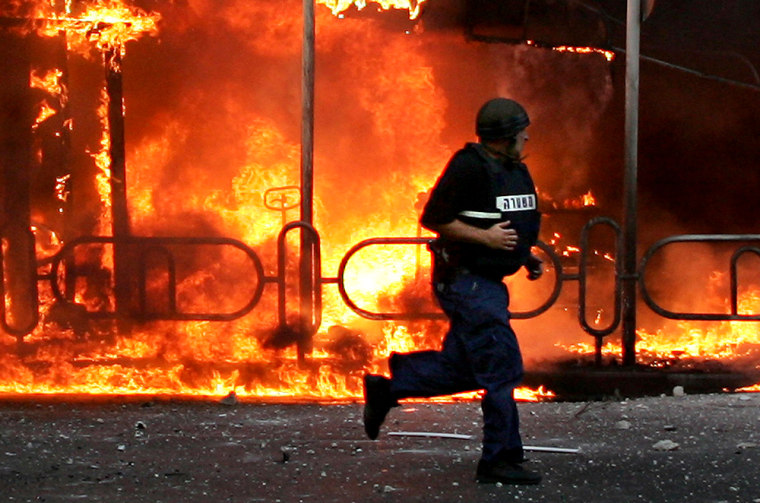TEL AVIV, Israel — For Israel, 2006 was a year to forget. Indeed, one week’s worth of headlines in the Holy Land contain more headache and tension than most other countries could bear.
The year began innocuously enough when Prime Minister Ariel Sharon suffered what appeared to be a minor stroke. But what proved to be a major medical emergency — he remains in a coma — kicked off a chain of events that led to what Britain’s Queen Elizabeth once called annus horribilis (a horrible year).
in a coma
After the initial stroke, Sharon was soon readmitted to the hospital and has laid in a coma ever since. His family refuses to cut him off life support, although doctors say he will never recover his brain power.
Enter Olmert
Sharon’s deputy prime Minister Ehud Olmert took over the reins of power, and quickly made what has been called one of Israel’s worst ever political appointments — elevating the Labor party leader, Amir Peretz, a powerful former trade union leader with little ministerial experience, to minister of defense. At the same time, Dan Halutz, the former head of the air force, became the armed forces chief of staff.
Both of these appointments were at the time hailed as bold, clever moves. Many felt it was time that a civilian ran the army; there was belief that maybe his responses to the Palestinians would be less brutal than those of an army man. And Halutz, it was felt, would bring a brave new perspective to Israel’s defense, which had always been in the hands of army generals. But that was before the war.
Israel-Hezbollah war
The response of these three men, Olmert, Peretz and Halutz, to the kidnapping of two Israeli soldiers on the northern border with Lebanon was universally condemned in Israel as disastrous. They launched an immediate war, which many felt Sharon, with his vast experience, would have avoided.
By failing to clearly defeat the few thousand fighters of Hezbollah, they harmed Israel’s deterrent capability, and inspired the Palestinians to begin to imitate Hezbollah’s successful tactics.
Spotlight on Iran
With war against Islamic militants in south Lebanon, as well as in Gaza, attention focused on their sponsors — Iran.
Iran’s push for nuclear weapons, which it denies, combined with its leaders call to wipe Israel of the face of the map, was naturally taken much more seriously in Israel than elsewhere. Israel has long warned that Iran posed the greatest threat to the region and must be stopped.
The good news that came out of Ahmadinejad’s violent threats is that the world woke up to the danger Iran poses. The bad news for Israel is that despite belatedly recognizing the threat, the world is still doing little about it.
Hamas victory The Hamas victory in the Palestinian parliamentary elections in January was a stunning surprise — above all, to Hamas, but also to the other key players: Fatah, the more moderate Palestinian party, and Israel.
Hamas refuses to recognize prior agreements reached between Israel and the Palestinian Authority, or to recognize Israel’s right to exist. This has led to sanctions against Hamas that made life, already unbearable for most Palestinians in Gaza, even harder.
Most of the likely key issues next year, of course, stem from the above.
Palestinian infighting
Will Hamas and Fatah find a way to govern together, or will the daily violence and killings turn into all out civil war? In 2006, almost as many Palestinians were killed by other Palestinians as by Israel.
Further conflict with Hezbollah?
Will Lebanon’s civil strife spill over, leading to more Israel-Hezbollah fighting?
What about Syria?
Will Syria enter the fray? Syria has been calling for peace talks with Israel, which Israel dismisses as a transparent ploy to gain international support. Washington does not want Israel to talk to Syria, but there are rising voices in Israel to open peace talks with Syria, even if the final price would be to return the Golan Heights.
Iran threat will likely grow
Iran will only grow as a threat to the region, along with calls to destroy its nuclear potential, if sanctions and negotiations do not succeed. And it’s not only Israel that’s concerned. Sunni nations such as Egypt, Saudi Arabia and Jordan (and eve Iraq) are worried too. They see the Iranian nuclear program as heading towards a Shiite bomb, aimed against them as much as against Israel.
Gaza strife continues
And at home, everyone is predicting another round of fighting against Hamas in Gaza.
As for the good news — that may have to wait until the year after.
